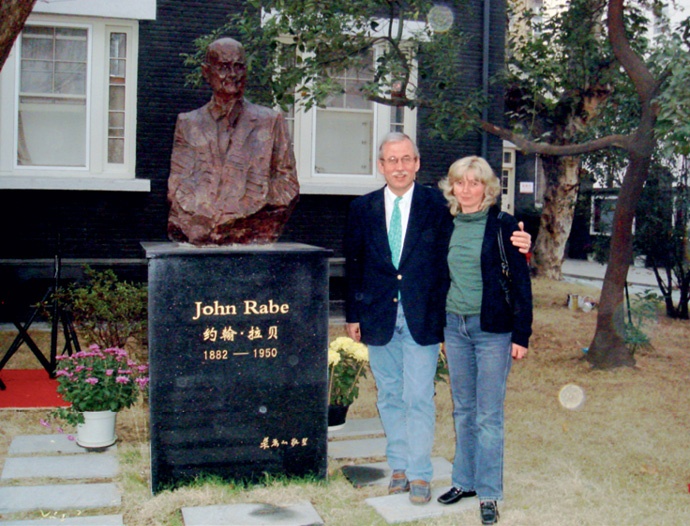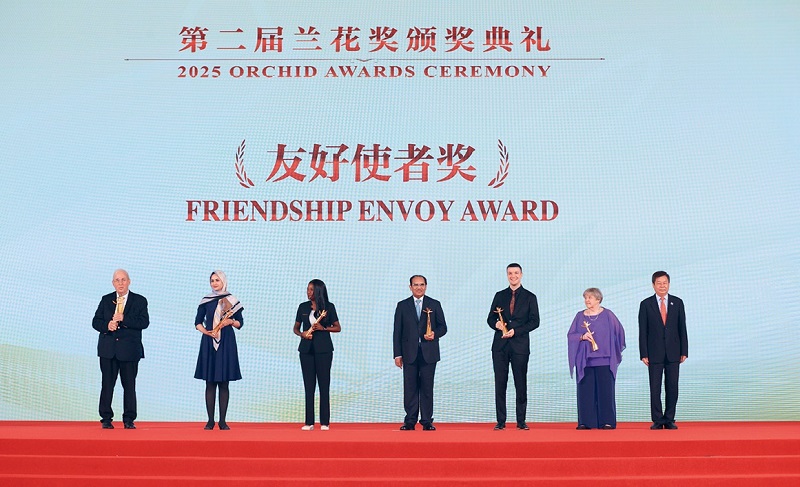
Thomas Rabe and his wife pose for a photo next to the statue of his grandfather, John Rabe. Courtesy of Thomas Rabe
AT No.1 Xiaofenqiao, Guangzhou Road, Nanjing, a grey-brick Western-style villa stands quietly in the green shade of dense plane trees. When the breeze stirs the leaves, they rustle as if whispering old stories. The two-story house was the former residence of John Rabe (1882-1950), representative of German Siemens China Co. in Nanjing. Today, it is his memorial hall.
Stepping into the courtyard, visitors encounter a bronze statue of John Rabe, whose gaze is calm yet resolute. Hidden from the buzz of the city, the peaceful compound was once a hideaway for countless Chinese during the 1937 Nanjing Massacre. The air-raid shelter that John Rabe built with his own hands still stands in the courtyard’s corner. It was in this house that he wrote the diaries that later became known as the Diaries of John Rabe, which shocked the world as the most powerful testimony to the brutality of Japanese invaders.
More than 80 years on, the house still draws visitors from across the world. Among them is John Rabe’s grandson – Thomas Rabe, professor emeritus at Heidelberg University and president of the Global John Rabe Exchange Center. Since the memorial opened to the public in 2006, he has been a regular visitor, carrying forward his grandfather’s mandate: telling the story of the humanitarian rescue of refugees to keep the Rabe spirit alive, and foster Sino-German exchange in culture, medicine, and beyond.
Humanitarian Spirit Shines on
Thomas Rabe was not yet born when his grandfather died; as a child he knew little of what his elders had experienced in China. “My father, Otto Rabe, was born and spent a happy youth time in China before returning to Germany for his studies. He often told me about life and culture in China, but rarely spoke of the war,” Rabe said. At the time when Thomas Rabe first opened the diaries, he was already a medical student.
“I will never forget the very moment I first read my grandfather’s entries written during the massacre,” said the 74-year-old, unconsciously slowing down his words.
In 1908, the young John Rabe first set foot on Chinese soil. Having lived in Beijing, Tianjin, and Nanjing, he fell in love with the country, married, and raised children here. “Before Nanjing’s fall into the hands of Japanese troops, everyone urged him to leave,” Thomas Rabe recounted, “But he stayed. My grandfather thought it was only natural not to abandon the Chinese in their misfortune, especially after receiving such long-standing warmth and hospitality from this country and its people.”
Amid the roar of Japanese bombs, John Rabe, with a dozen foreign friends, formed the International Committee for the Nanjing Safety Zone, and he was the first head of the organization. They marked out a neutral area of about four square kilometers, set up 25 refugee camps and saved the lives of around 250,000 Chinese people between 1937 and 1938. Rabe’s own house became one of those shelters. In his rooms, little garden and the neighboring German school, he took in more than 600 civilians, braving danger to raise funds, and find food, medicine and daily necessities for them. He was thus dubbed the “god of mercy” by Nanjing locals for his heroic deeds.
“With typical German thoroughness, my grandfather recorded the atrocities in more than 2,000 diary pages, with over 100 photographs,” said Thomas Rabe. The brutality shocked him, and his grandfather’s decision to protect civilians filled him with pride.


Thomas Rabe (first left) receives the Friendship Envoy Award on July 10, 2025. Courtesy of the Orchid Awards Secretariat
Historical Responsibility
“His humanitarian feats during the Nanjing Massacre have always been the cornerstone of our family’s spirit. It is my mission to carry forward the historical responsibility embedded in his diaries,” said Thomas Rabe. The sense of duty has become an invisible bond tying the Rabe family to China.
Before John Rabe’s death, he entrusted the diaries and all related historical documents to his son, who later passed them all to Thomas Rabe, adding that the records are of extraordinarily significance to China. In 2016, Thomas Rabe donated the original manuscript to China’s National Archives. The diaries are now inscribed on UNESCO’s Memory of the World Register as one of the most complete and detailed historical records of the Nanjing Massacre.
“No one can erase historical facts. We all need to face the reality and understand history,” Thomas Rabe stressed. “If only the Japanese could acknowledge the past and apologize, it would lay the groundwork for forgiveness, for which I would be deeply gratified. It is my family’s historic mission, and also my grandfather’s lifelong wish.”
With this conviction, Thomas Rabe and his wife have, since 2005, established six John Rabe International Exchange Centers in Germany, Romania, Spain, and China. Beyond preserving archives, these centers hold exhibitions and lectures to tell the history of the massacre and the moving stories of international friends who aided victims in Nanjing, carrying forward John Rabe’s humanitarian spirit.
Courage, universal love, and the pursuit of peace are the legacy of John Rabe, said his grandson. At a time of mounting conflict and division, he emphasized the importance of passing this spirit onto the world’s younger generations. “Over 10 years, I have dedicated my life to writing the book Rabe and China,” said Thomas Rabe. “It is not only a biography of my grandfather and his 30 years in China, but also a book that continues the friendship between the Rabe family and the Chinese people.” Notably, all royalties from the book are devoted to humanitarian causes.
In China, Thomas Rabe is the respected “grandson of Rabe”; while in Germany, he is an internationally renowned expert in gynaecological endocrinology. He has spent nearly four decades at the Women’s Hospital of Heidelberg University, making outstanding contributions to reproductive endocrinology.
In 2013, at colleagues’ invitation, Thomas Rabe joined an international team led by Chinese professor Ruan Xiangyan at Beijing Obstetrics and Gynaecology Hospital, Capital Medical University, writing a new chapter in China-German medical cooperation. Addressing the worldwide challenge of fertility preservation for cancer patients, he shared years of research findings and helped Chinese doctors achieve a series of breakthroughs: China’s first cryopreserved ovarian-tissue transplantation, the first natural pregnancy after transplantation and the first healthy birth. These three historic achievements have propelled China to the international forefront in gynaecological endocrinology and reproduction.
In his 70s, Thomas Rabe has written his own legend. He helped establish an International Interdisciplinary Endometriosis Center; as German vice-chair, he fostered the China-German Society of Obstetrics and Gynaecology; he co-authored several medical monographs and spearheaded the Virtual Medical Academy. Each endeavor is a modern interpretation of the Rabe spirit.
Second Homeland
“The Chinese people commemorate John Rabe because he cherished life and pursued peace,” Thomas Rabe mentioned, repeating Chinese President Xi Jinping’s words. “For my family, this is the highest praise from the Chinese government and its people; we are deeply honored that China has never forgotten what my grandfather and our family did.”
This gratitude has followed Thomas Rabe throughout his life. In 2015, he received the Commemorative Medal for the 70th Anniversary of the Victory of the Chinese People’s War of Resistance Against Japanese Aggression; in 2018, he was awarded the Chinese Government Friendship Prize, the highest honor China bestows on foreign experts for outstanding contributions to the country’s modernization; then in 2025, he stepped onto the Orchid Awards stage as a “Friendship Envoy.” The citation read: “Thomas Rabe has long devoted himself to Sino-German medical cooperation and cultural exchange, writing a family saga of four generations spanning 117 years of Chinese affinity.”
“This is not merely my personal honor, but an honor for the four generations of my family,” The silver-haired humanitarian said. The Rabes have always felt that China is their “second homeland.” Today, the bond is being renewed by the next generation, he added. Thomas’ son, Maximilian Rabe, speaks fluent Chinese and continues to work for the Rabe Exchange Center, passing on the humanitarian spirit.
The year 2025 marks the 80th anniversary of China’s victory in the Chinese people’s War of Resistance against Japanese Aggression and the World Anti-Fascist War. For Thomas Rabe, his grandfather’s legacy remains as vital as ever: “Peace demands the vigilance of every individual. Confronted with injustice, we should never stand idly by, but extend a helping hand, no matter how small our strength is.”
Talking about the Victory Day parade China will hold on September 3, a spark of anticipation glimmers in his eyes, though he has attended similar events many times. “Standing at Tiananmen Square to witness the historic moment will be my greatest honor, and we owe it all to my grandfather,” he added.